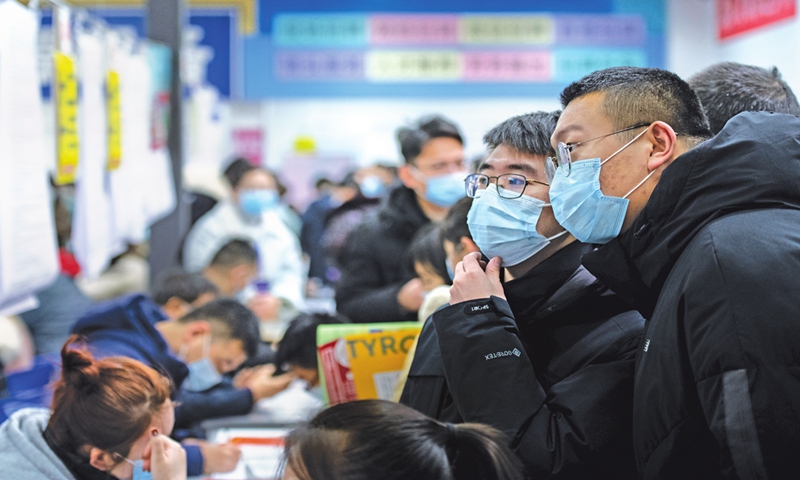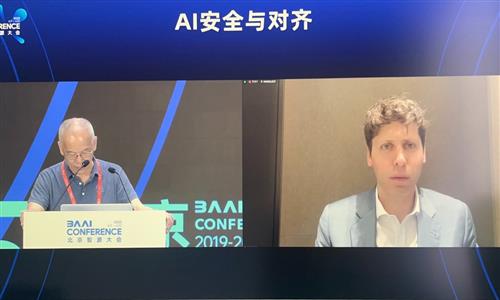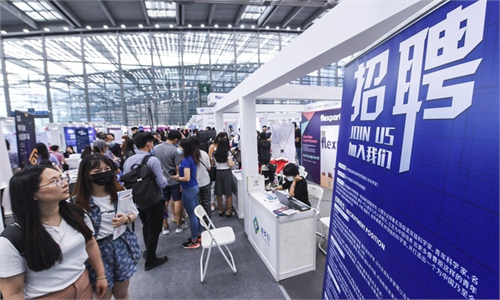
Two college graduates read a job description at a recruitment fair held in Taiyuan, North China's Shanxi Province. Photo:cnsphoto
The Beijing-based Microsoft Research Asia has begun seeking visas to move some of its best artificial intelligence (AI) researchers from China to its institute in Vancouver, Canada, the Financial Times (FT) reported on Saturday, citing four people with knowledge of the plans.It remains unclear whether the move is the company's response to political tensions between China and the US or a normal staff preparation plan for a new lab in Vancouver as the company claimed. The US company is reportedly creating a new lab in Canada, which would be staffed by experts from around the world.
Against the background of the US' repeated crackdowns on Chinese technology companies and the US' high-tech "decoupling" push, Microsoft's reported plan to relocate some of its top AI experts has drawn attention both in China and overseas. Many view the Microsoft's reported plan through the lens of the competition between China and the US in the crucial AI sector. The FT report, for example, claimed that the move "threatens to gut an essential training ground for the Asian country's tech talent."
Indeed, a global AI race is heating up and much of that race centers on talent. However, claiming that the relocation of some researchers from a single lab "threatens" China's talent training is pure exaggeration. China has made great strides in expanding its high-tech talent pool in recent years and the country has unique advantages with its massive market and growing high-tech sector to both train local talent and attract those from overseas.
In the face of the severe external environment, it is essential for China to make greater efforts to attract global talent. With the increasing global competition in terms of economic as well as scientific and technological strength, the race for high-end talent has become fiercer among various countries. The past few years saw the US, the UK, Germany, Canada, Japan and other countries launch various polices to lure high-end research talent, intensifying international competition.
This is because the global competition in areas like AI, quantum technology, genetic engineering and other cutting-edge technologies is actually a competition for high-end researchers. One of the key reasons behind the rapid rise of the US after the World War II is its large pool of international talent in cutting-edge technology research and development. Given the time investment and other limitations in talent cultivation, countries and multinationals have attached growing importance to attracting high-end talent.
As a developing country, China does not have inherent advantages in attracting global talent, especially compared with other developed countries. And as the US increasingly pushes for a technological "decoupling" from China, there have also been growing restrictions on global technological cooperation and exchanges. In particular, because of the restrictions and suppression imposed by the US on Chinese technological companies and industries, talent exchanges face mounting challenges.
Yet, from another perspective, the US' containment strategy has also stimulated China's talent cultivation for independent technological innovation as well as government investment in high-tech fields. If anything, China's rapid high-tech development is evident enough to demonstrate China's attractiveness to global talent. For instance, a number of well-known overseas researchers have come to China for researches, including Kaldi creator Daniel Povey, Yukio Sakamoto, who is dubbed the "godfather of Japan's DRAM," and Fields Medal winner Laurent Lafforgue, among others.
Of course, China still needs to remain vigilant against foreign restrictions on talent exchanges and take more proactive measures to retain top talent, including continuous opening-up to attract overseas talent.
First, investment in high-tech fields should be further increased and the efficiency of the use of scientific research funds should be improved, so as to provide better research conditions and working environment for researchers. Second, access for foreign researchers should be further expanded and more convenient working and living conditions should be created. Moreover, the protection of intellectual property rights should be strengthened to offer better protection for innovation results. Last but not least, both the government and businesses need to invest more in improving researchers' income and benefits.
It's crucial to point out that while the US is putting restrictions on talent exchanges, China is embracing global talent by opening its doors wider and offering continuously improving working conditions.



